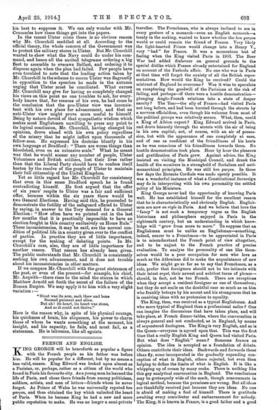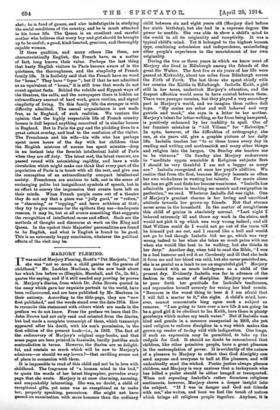FRENCH AND ENGLISH. K ING GEORGE will be henceforth as popular
a figure with the French people as his father was before him. He will be popular for a different, but by no means a less valid, reason. King Edward was looked upon almost as a Parisian, or, perhaps, rather as a citizen of the world who found in Paris his favourite city. As a young man he learned the life of Paris, and chose there friends from among politicians, soldiers, artists, and men of letters—friends whom he never forgot. As Prince of Wales he was universally reputed bon garcon, and thus obtained the key which unlocked the heart of Paris. When he became King he had a new and more public reputation to make. He was no longer a semi-private traveller. The Frenchman, who is always inclined to see in every gesture of a monarch—even an English monarch—a treaty in the making, wanted to know whether the bon garcon would or could remain the friend of France. Very likely the light-hearted Prince would change into a Henry V., very " bad" for France. It was a momentous test of feeling when the King visited Paris in 1903. The Boer War had added disfavour on general grounds to the special dislike which France already entertained for England on account of the Fashoda affair. No one who was in Paris at that time will forget the anxiety of all the British repre- sentatives. How would the King be received? Could the mistrust of England be overcome ? Was it wise to speculate on recapturing the goodwill of the Parisians at the risk of failing, and, perhaps—if there were a hostile demonstration— plunging Anglo-French relations into a state of deeper enmity? The Tsar—the ally of France—had visited Paris not long before, and had been hurried through the streets by a nervous officialdom, even though his welcome from moat of the political groups was relatively secure. What, then, could a King of Albion expect P King Edward arrived in Paris, and drove leisurely through the streets with the air of being in his own capital; not, of course, with an air of posses- sion, but with the appearance of one completely at ease, and of one as confident of the friendliness of his hosts as he was conscious of his friendliness towards them. No hostile demonstration took place. Hour by hour the pleasure and gratification of Paris grew. Against advice, the King insisted on visiting the Municipal Council, and drank the health of the members in a stronghold of Socialism and anti- monarchical principles. He was still bon garcon. In those few days the Entente Cordiale was made openly possible. It was a wonderful instance of what a Constitutional Sovereign may do in interpreting with his own personality the settled policy of his Ministers.
King George never had the opportunity of knowing Paris well. He has established himself for the excellent reason that he is characteristically and obviously English. English. men are now en regle in Paris. And we believe that here the "fancy" is not such a temporary vogue as the English historians and philosophers enjoyed in Paris in the eighteenth century, but an understanding in which know- ledge will "grow from more to more." To suppose that an Englishman must be unlike an Englishman—something, indeed, nearer to a Frenchman—to be appreciated in Paris is to misunderstand the French point of view altogether, and to be unjust to the French practice of precise evaluation. To analyse the personality of one like them- selves would be a poor occupation for men who lore as much as the Athenians did to make the acquaintance of new ideas. We might go so far as to say that Frenchmen, as a rule, prefer that foreigners should not be too intimate with their latest argot, their newest and subtlest turns of phrase— should, in fact, not be too French. There are exceptions when they accept a resident foreigner as one of themselves; but they do not smile on the doubtful case so much as on him who frankly betrays by his accent and his strangeness that he is receiving ideas with no pretension to equality.
The King, then, was received as a typical Englishman. And who more typical of England than a professional sailor ? One can imagine the discussions that have taken place, and will take place, at French dinner-tables, where the conversation is always general and not conducted, as in England, by means of sequestered duologues. The King is very English, and so is the Queen—everyone is agreed upon that. This was the first time that a really English King and Queen had visited Paris. But what does " English " mean ? Someone frames an opinion. The idea is accepted as a foundation of debate. Others contribute their ideas. Backwards and forwards these ideas fly, some incorporated in the gradually expanding con- ception of what is English, others rejected, but even then helping to define the limits of what is English. It is like a whipping up of cream by many cooks. There is nothing like this gay analytical conversation in England. The conclusions may be grotesquely wide of the mark, though consummate in logical method, because the premisses are wrong. But all ideas are thankfully received just because they are ideas. No one is afraid of making a fool of himself. There is gratitude awaiting every contributor and embarrassment for nobody. The King, it is known in France, is a good father and good
shot; he is fond of games, and also indefatigable in studying the social conditions of the country, and he is much attached to his home life. The Queen is an excellent and careful mother who believes that every boy and girt should be brought IV-to be useful; a good, kind-hearted, gracious, and thoroughly capable woman.
If these qualities, and many others like them, are characteristically English, the French have, as a matter of fact, long known their value. Perhaps the last thing that hasty English visitors to Paris become aware of is the quietness, the thoroughness, and the simplicity of French family life. It is foolishly said that the French have no word for "home." They have " foyer "; but if that be not admitted as an equivalent of "home," it is still true that words do not count against facts. Behind the volatile and flippant ways of the theatres, the cafes, and the newspapers there is hidden an extraordinary amount of hard work, grave routine, and signal simplicity of living. To this family life the stranger is with difficulty admitted. The casual acquaintance is not made free, as in England, of such realities. We venture the opinion that the highly respectable life of French country houses is dull beyond anything conceived of in similar houses in England. But in Paris the gay and the plodding lives to a great extent overlap, and lead to the confusion of the visitor. The Frenchman and his wife—his wife who has perhaps spent more hours of the day with her children than the English mistress of nurses has spent minutes—drop in an instant into the feverish intellectual habit of Paris when they are off duty. The latest mot, the latest rumour, are passed round with astonishing rapidity, and have a wide circulation which might make one think that every part of the population of Paris is in touch with all the rest, and give one the conception of an extraordinarily compact intellectual society. Frenchmen are anxious to talk, not in the sense of exchanging polite but insignificant symbols of speech, but in an effort to convey the impression that events have left on their minds. When French people come out of a theatre they do not say that a piece was "jolly good," or "rotten," or "charming," or "topping," and leave criticism at that; they try to give reasons for the epithets they use—inadequate reasons, it may be, but at all events something that suggests the recognition of intellectual cause and effect. Such are the methods of thought and discourse at work on the King and Queen. In the upshot their Majesties' personalities are found to be English, and what is English is found to be good. This is an extremely happy conclusion, whatever the- political effects of the visit may be.



























































 Previous page
Previous page